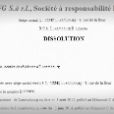Accounting on a net asset basis
The accounting principle to be implemented are different depending on whether the company is presumed to want and to be able to continue its activity, or if, on the contrary, it has decided, or even more, if it is forced to stop its activity.
Accounting based on the principle of going concern
When it is assumed that a company will continue its activity, the accounting operations are conventionally recorded on the basis of the principle of going concern: the assets are for example recorded at their acquisition value (or at their cost price) , less any depreciation (or value adjustments) to be made, etc.
Accounting on a net asset basis
When, on the contrary, it is presumed that the company will not wish to, or will not be able to, continue its activity, the accounting entries must then be made on a net asset basis.
In this context, the managers of a company must systematically wonder, at the latest when approving of the financial statements to be submitted to the shareholders, the capacity and willingness of the company to continue its activity for at least more than 12 months from the day the financial year they are approving of ended .
In this respect, the managers should for example question whether the company is to continue its activity or if they are about to begin a process of liquidation or dissolution.
They should also question the company is able to continue its activity if it faces such difficulties that its dissolution is probable or that a bankruptcy is imminent: for example, the loss of an important market, the loss of a key supplier, the accumulation of significant losses, cash flow difficulties ...
In each of these two situations, managers must therefore abandon the going concern basis to present the accounting entries on a net asset basis, so as to meet the higher objective of fairness.
Accounting on a net asset basis aims at determining a final financial situation that would result in an inclusive balance sheet that should encompass all realizable assets and all probable or due liabilities. Concretely, accounting on a net asset basis proceeds as follows:
- accounting items that do not have real economic value are immediately reversed (eg. establishment costs);
- realizable assets are no longer reported at historical cost but at probable sale value (in principle the market value);
- assets that are not reported in the accounts but which would have an economic value (for example a goodwill created by the company) must be recognized at probable sale value;
- “fixed assets” become “current assets”;
- Any future income and future expenses (including interest, indemnities or penalties due as well as liquidation costs) must be immediately recognized regardless of their date of occurrence and regardless the time-period principle (because liquidation is a single period)
- deferred taxes caused by the liquidation process must be provisioned or anticipated.
Once again, even if the liquidation process has not yet started, the company must record its transactions on the net asset values standard as soon as it is clear that it will not want, or that it will not be able to continue its activity and nevertheless go on filing its accounts and financial statements (established on a net asset basis) on the ECDF platform.
Once the liquidation process is initiated, the company is exempted from filing its accounts (still established on a liquidation basis) on the ECDF platform.
Penalties
There are many sanctions which would apply to directors who do not prepare financial statements on a liquidation basis despite the situation would require it when the continuation of the business is unlikely, including:
The tax administration would be justified in rejecting the company's accounts, then taxing ex officio and unilaterally the presumed result, and then fining the taxpayer. In addition, the tax losses carried forward would be erased and therefore no longer benefit the taxpayer because their carry forward is subject to the keeping of regular accounts.
Then at the criminal level, if it turned out that the wrong accounting standard had been intentionally chosen, a way would be open to criminal action on the basis of the "false balance sheet".





